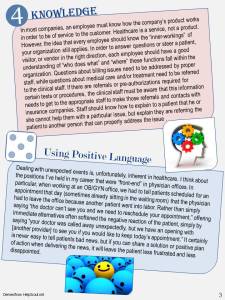Training Tips for Healthcare Employees | RMS Healthcare
This blog article is a series of posts written by Megan O’Donnell, Manager of RMS Healthcare. RMS Healthcare is a division of Research & Marketing Strategies (RMS) located in Syracuse, NY. This post covers skills 4 through 6 and is based on the HelpScout.net article titled “15 Customer Service Skills that Every Employee Needs”, written by Gregory Ciotti. For a full copy of all 15 training tips for healthcare employees contact Megan at 1-866-567-5422 or email at MeganO@RMSresults.com.
- Knowledge – In most companies, an employee must know how the company’s product works in order to be of service to the customer. Healthcare is a service, not a product. However, the idea that every employee should know the “inner-workings” of your organization still applies. In order to answer questions or steer a patient, visitor, or vendor in the right direction, each employee should have a good understanding of “who does what” and “where” these functions fall within the organization. Questions about billing issues need to be addressed by proper staff, while questions about medical care and/or treatment need to be referred to the clinical staff. If there are referrals or pre-authorizations required for certain tests or procedures, the clinical staff must be aware that this information needs to get to the appropriate staff to make those referrals and contacts with insurance companies. Staff should know how to explain to a patient that he or she cannot help them with a particular issue, but explain they are referring the patient to another person that can properly address the issue.
- Using positive language – Dealing with unexpected events is, unfortunately, inherent in healthcare. I think about the positions I’ve held in my career that were “front-end” in physician offices. In particular, when working at an OB/GYN office, we had to tell patients scheduled for an appointment that day (sometimes already sitting in the waiting room) that the physician had to leave the office because another patient went into labor. Rather than simply saying “the doctor can’t see you and we need to reschedule your appointment,” offering immediate alternatives often softened the negative reaction of the patient, simply by saying “your doctor was called away unexpectedly, but we have an opening with [another provider] to see you if you would like to keep today’s appointment.” It certainly is never easy to tell patients bad news, but if you can share a solution or positive plan of action when delivering the news, it will leave the patient less frustrated and less disappointed.
- Acting skills – The ability to be caring and empathetic is something that probably comes naturally to most people who work in healthcare, otherwise, I don’t think they would be working in the field. Sometimes acting skills need to come into play when you are having a bad day, as we all have them. Maybe the phone is ringing off the hook, the doctor is running late, or a piece of equipment is down. Despite all of this, it is still important to put your “best face” on for patients and keep the focus on what matters to them. A cheerful and positive attitude will let the patient know that you are there for them in their time of need.
RMS Healthcare is composed of two divisions: (1) Healthcare Analytics which handles the following CAHPS® work: HCAHPS®, HH-CAHPS®, CG-CAHPS®, and ICH CAHPS® and (2) Practice Transformation which handles the coordination of Patient Centered Medical Home (PCMH) recognition through NCQA, URAC, and the Accreditation Association for Ambulatory Health Care. For more information about RMS Healthcare and its service offering visit the website page by clicking here.
